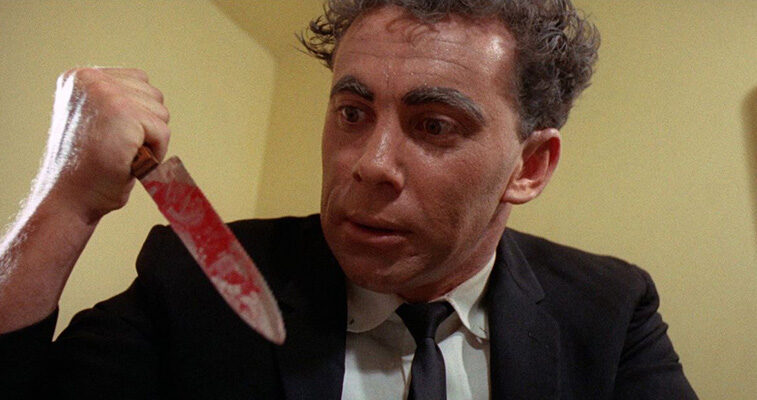[2]
Herschell Gordon Lewis earned the title ‘godfather of gore’ because of this film, the first widely distributed movie to feature excessive blood and bodily mutilation. Its novelty with young drive-in audiences was so strong, that it allowed Lewis to write and direct dozens more of such movies for the next ten years. In this first bloodbath, Mal Arnold plays a peculiar grocery store owner who wants to bring an ancient Egyptian goddess back to life through a series of sacrifices. Several unsuspecting young women fall under the killer’s blade, all while an inept cop investigates the murders.
I know there’s an audience for this sort of ultra-low-budget, no-frills, ‘Ed Woodian’ filmmaking, but Blood Feast just doesn’t do it for me. There’s no compelling story, characters, message, or craftsmanship. If the whole story stayed with the killer, it might have held my interest more. Whenever the police are on-screen, the whole movie just comes to a dead stop. The novelty that drove interest in 1963 is unfortunately dated. The effects in Blood Feast are primitive and laughable by today’s standards. But then, I guess that’s part of its appeal among Lewis’ fans. Digging for positive notes, the authentic ’60s setting is a bit like opening a time capsule. And it’s also amusing that the killer meets his demise in a garbage dump, showing at least some poetic awareness on the filmmakers’ part.
Lewis’ work may not be for everyone, but his place in cinema history is an important one. He and his producing partner, David Friedman, were the first filmmakers to bring exploitation cinema out of limited, regional release and into nationwide accessibility. It was counter-culture at its finest — big screen entertainment made with miniscule budgets, produced out of Florida instead of New York or Los Angeles, made with entirely amateur casts and crews, catering to a young crowd who desired to see what had never been seen before in movies. If they hadn’t delivered so well to their target audience, Lewis and Friedman’s movies would have disappeared from public consciousness over the last fifty years. But just the opposite has happened. Schlock, love it or leave it, is forever.

